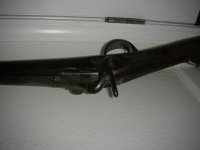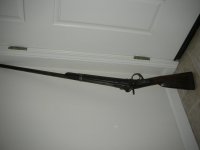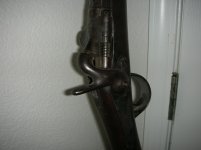You are using an out of date browser. It may not display this or other websites correctly.
You should upgrade or use an alternative browser.
You should upgrade or use an alternative browser.
Help, id civil war carbine rifle
- Thread starter sheffyus
- Start date
Jim Watson
New member
It is not a US-CSA Civil War piece.
It is what is commonly known as a Zulu.
It started out as a conversion of a French or Belgian muzzleloading rifle musket to a breechloader using a side swinging breechblock similar to the British Snider.
Then when those were obsolete, the stocks were shortened and the rifling was reamed out to make them into shotguns for sale in what we now call "third world." Back then, the African colonies, mostly; but some were fobbed off on Americans and Latin Americans.
I don't have a period US listing for them but in the 1911 Alfa catalog, one would cost 19 German Marks where a regular Stevens single shot shotgun was 25 Marks.
It is what is commonly known as a Zulu.
It started out as a conversion of a French or Belgian muzzleloading rifle musket to a breechloader using a side swinging breechblock similar to the British Snider.
Then when those were obsolete, the stocks were shortened and the rifling was reamed out to make them into shotguns for sale in what we now call "third world." Back then, the African colonies, mostly; but some were fobbed off on Americans and Latin Americans.
I don't have a period US listing for them but in the 1911 Alfa catalog, one would cost 19 German Marks where a regular Stevens single shot shotgun was 25 Marks.
Yep; A Zulu
Sure looks like the one I identified for a friend this past summer. It had been sitting in a barn for a number of years and someone thought it was just an old pipe. Do a search in here and on the internet and you will find a bunch of information on them. ....
Be Safe !!!
Sure looks like the one I identified for a friend this past summer. It had been sitting in a barn for a number of years and someone thought it was just an old pipe. Do a search in here and on the internet and you will find a bunch of information on them. ....
Be Safe !!!
That particular gun is the so-called "Tabatiere" conversion of the French Model 1857 musket. The nickname means "snuffbox" and was called that because it reminded some folks of the way the lid opened on the typical snuff box of the time. In general, it looks, and works, like the British Snider conversion. Originally intended to allow the French to convert millions of muzzle loading muskets to use fixed cartridges, they soon became obsolete and were sold to surplus companies who peddled them in Africa (where they got the name "Zulu guns"), in Asia, and the U.S. where many were reamed out and sold as shotguns.
While some French muskets were bought by the Union and used to arm rear area troops in the Civil War, the "tabatiere" conversions were too late for that conflict.
Jim
While some French muskets were bought by the Union and used to arm rear area troops in the Civil War, the "tabatiere" conversions were too late for that conflict.
Jim



